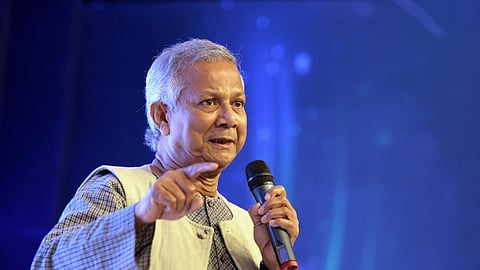In high-stakes meet, Yunus holds talks with BNP acting chairman in London amid dispute over poll timing
NEW DELHI: In a high-stakes political encounter, the Chief Adviser of the interim government in Bangladesh Prof Muhammad Yunus and BNP acting chairman Tarique Rahman held a much-anticipated meeting on Friday at the Dorchester Hotel in London’s Park Lane.
While the official agenda remains under wraps, the symbolism of the meeting is clear -- two of Bangladesh's most pivotal political figures, one helming the interim government, the other leading the largest opposition party, sat down face-to-face amid mounting tension over the timing of the next general election.
The meeting began with formal courtesies. Tarique Rahman inquired about Yunus’s health and conveyed greetings from his mother, former Prime Minister Khaleda Zia. A brief exchange on London’s weather followed, but the tone quickly shifted to business.
“This is going to be a very important meeting for Bangladesh ahead of the election,” Yunus’ press secretary Shafiqul Alam said ahead of the talks, calling it a key moment between the chief of the interim government and the de facto head of the opposition.
The encounter, expected to be private but expandable at the leaders' discretion, lasted approximately two hours. At the heart of the discussion is a fundamental dispute over the election schedule. Yunus recently announced that the 13th general election will be held in early April next year. The BNP, however, has firmly rejected this timeframe, demanding elections by December.
BNP insiders suggest that Tarique is pushing for an earlier date, citing logistical concerns around the holy month of Ramadan, scheduled to end in mid-March, and the overlapping of key academic examinations.
A compromise date in January or February may be floated if the Chief Adviser signals openness to negotiation.
Beyond the calendar, broader political issues were expected to be on the table: ratification of interim government decisions, electoral reforms, “justice for victims of the July uprising”, and a roadmap for a peaceful transfer of power.
One especially sensitive topic is Tarique Rahman’s long-speculated return to Bangladesh after 17 years in exile. Although no official confirmation has been made, Bangladesh media quoting party sources reported that growing speculation suggests that a return before August 5 is being seriously considered. Security guarantees for Tarique are also believed to be part of the discussion, these reports said.
Dr Kazi Mohammad Mahbubur Rahman of Dhaka University told the Dhaka Tribune that the encounter was “potentially decisive,” warning that “there is no room for failure.”
The BNP sees this dialogue as a last chance to break the electoral deadlock and avoid a crisis of legitimacy for the next government.

